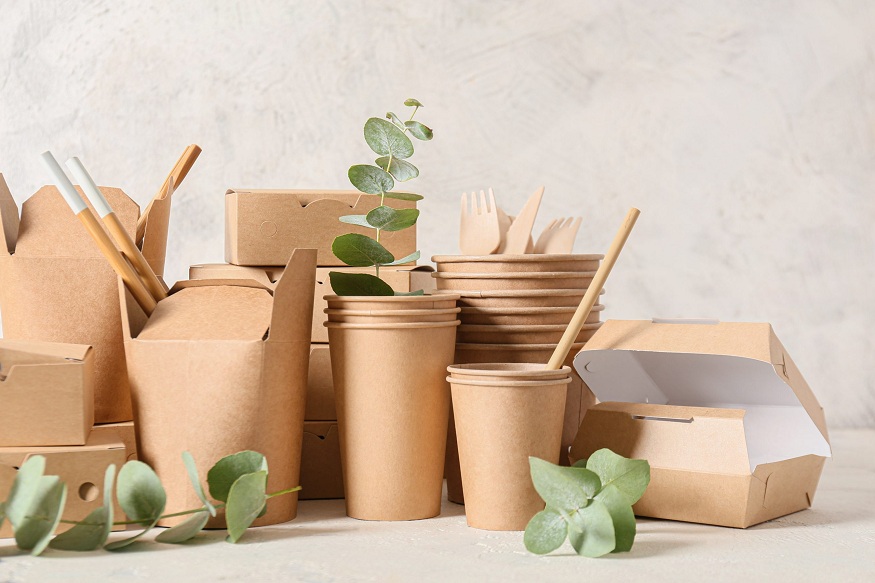Customers are calling for more environmentally friendly products and packaging options in today’s environmentally concerned society. Given the wide range of packaged items it offers, the cookie sector has drawn criticism for using biodegradable packaging materials for food. With the potential to transform the business and open the door to a more environmentally friendly future, a move towards sustainable packaging options is already underway.
Conventional Packaging’s Effects:
Plastic packaging or polystyrene foam utilized in the traditional cookie packaging method has an extraordinary capacity to contribute to environmental issues. Just as plastic waste begins to pile up due to these materials’ non-biodegradability, plastic debris is becoming a more and more prominent problem. These, in turn, release environmentally harmful gasses, besides creating in the process greenhouse effect aggravating climate change detrimentally. This procedure requires the use of non-renewable resources. language
The Revolution occurred in the Substitution of Biodegradable Materials:
The industry of cookies, probably going to receive better solutions if using compostable material was a prospect. Vegan leather is made from plant-based materials such as cotton, hemp, bark fibers, starch, or biopolymers which offer a biodegradable alternative which are safer for the ecosystem as they do not endanger it once disintegrated.
Meanwhile, polylactic acid (PLA) , which is made of biodegradable and bio-based materials such as maize starch, and sugarcane, is the other plastic-like product that is gaining acceptance and spreading its wings in the market. Solemn certitude of cookies’ freshness and longevity, PLA can be appointed to make strong, and then nature-friendly packaging for them.
Paper cups made sustainably: A sizzling and sumptuous brunch
Along the lines of biodegradable paper cups, coming up with sustainable paper cups is also turning into a viable option for catering the public appetite with the appetizing snacks and cookies packed in an individual package. Utilizing recycled and consequently fairly gathered materials reduces the amount of waste and the challenge to Nature in the process of their manufacturing.
Cookie producers may demonstrate their dedication to environmental responsibility and provide their consumers with an exceptional and unforgettable experience by using sustainable paper cups. As you sip a warm biscuit from a pretty paper cup, you can think of nothing better than to be a part of the future green movement.
Green Packaging Solutions’ Advantages:
And though environmental preservation is probably the most commonly known point for biodegradable eco friendly cookie packaging, there are quite a few more angles. These fixes can:
Strengthen Brand Image: Customers appreciate and love businesses that are green affairs conscious and make recycling packaging a priority. This can improve the brand’s image and attract more customers who care for the environment.
Cut Operational Costs: Contrast the cost of production for the biodegradable material and the sustainable paper cup with the cost of the conventional packing solution; these tend to be very competitive. This would effectively play a part in reducing the manufacturing costs for cookie companies. The tool is capable of understanding the context and generating creative and engaging content that keeps the visitors hooked.
Adhere to Regulations: Also, the legislation on the use of plastic trash and packaging has now become strict in the world. However, cookie firms can still be on top of the trends and avoid penalties and fines by implementing green solutions.
Encourage Innovation: All see the innovation of the whole packaging industry which can be triggered by the quest for environmentally-friendly packaging solutions, which finally can bring new types of materials, unique manufacturing methods, and designs to the market.
Rise Above Obstacles and Accept Change:
Nevertheless, in the long run, benefits prevail over the short-term issues of transition to eco-friendly solutions in packages, and these difficulties may include the necessity of immediate costs, changes in the production chain, etc. One of the main ways to overcome such difficulties and bring the concept of sustainability into practice is by cooperation with materials suppliers, packaging manufacturers, and industry brands.
And more than this, it is necessary to inform them about the positive pros of ecological substitutes and show how harmful traditional packaging is. Cookie companies can win the support and reassurance of the customers by taking an open communication approach and building knowledge about their environmental practices that can be shared, to create a commitment to a resilient and ecological future.
Sustainable Cookie Packaging’s Future:
As a model for other industries to follow, the cookie industry has the chance to set the standard for environmentally friendly packaging options. Using biodegradable materials and sustainable paper cups would help the environment and establish cookie brands as ethical and progressive leaders in the market as consumer demand for eco-friendly products grows.
Teamwork and Collaboration: Essential Ingredients for Success
Working together, stakeholders can genuinely transform the cookie sector by implementing eco-friendly packaging alternatives. For creative and practical solutions suited to their particular requirements, cookie producers can collaborate closely with packaging designers, sustainability specialists, and suppliers of materials.
Enterprises may expedite the adoption of eco friendly paper cup and biodegradable materials by cultivating transparent communication and knowledge exchange among diverse stakeholders. Additionally, developing strategic alliances with businesses that support sustainability and environmental protection can yield insightful information, useful materials, and even co-branding opportunities.
Collaboration between the Industry and Regulation:
The adoption of environmentally friendly packaging options in the cookie sector is greatly aided by the actions of governments and regulatory agencies. These organizations can foster a change-friendly atmosphere by putting in place laws and policies that either require or promote the use of sustainable resources.
Additionally crucial is industry-wide cooperation. To promote legislation that facilitates the switch to environmentally friendly packaging, cookie producers can band together, exchange best practices, and set industry standards. The industry can create more good change on a broader scale by speaking with one voice and using its combined strength.
Continuing Innovation and Dedication is the Way Ahead:
Prolonged innovation and a firm dedication to sustainability are essential as the cookie sector adopts environmentally friendly packaging options. Extensive research and development endeavors ought to concentrate on investigating novel biodegradable substances, refining current remedies, and streamlining manufacturing procedures to reduce ecological ramifications.
Conclusion:
The business has an opportunity to transform its packaging strategy and pave the way for future generations to live in a more sustainable and ecologically conscientious manner by adopting eco-friendly packaging options. The solution is delightfully sweet and meets the needs of the earth as well as taste buds.




